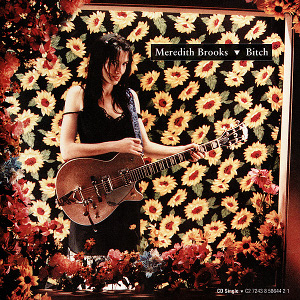
"Bitch" (also known by its censored title "Nothing In Between" and later as "Bitch (Nothing In Between)") is a song by American singer-songwriter Meredith Brooks and co-written with Shelly Peiken. The song was released to American radio in March 1997 as the lead single from Brooks' second album, Blurring the Edges (1997), and was issued as a commercial single on May 20, 1997. The song was produced by punk notable Geza X.
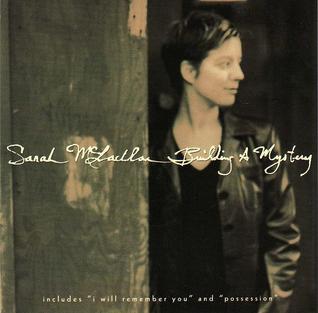
"Building a Mystery" is a song by Canadian singer-songwriter Sarah McLachlan from her fourth studio album, Surfacing (1997). At a live performance, Sarah explains the song as being "basically about the fact that we all... have insecurities to hide, and we often do that by putting on a facade." She also goes on to say that "unfortunately, if we just be who we are, that's usually the more attractive and beautiful thing".

"Together Again" is a song by American singer Janet Jackson from her sixth studio album, The Velvet Rope (1997). It was written and produced by Jackson and Jimmy Jam and Terry Lewis, with additional writing by Jackson's then-husband René Elizondo Jr. It was released as the second single from the album in December 1997 by Virgin Records. Originally written as a ballad, the track was rearranged as an uptempo dance song. Jackson was inspired to write the song by her own private discovery of losing a friend to AIDS, as well as by a piece of fan mail she received from a young boy in England who had lost his father.
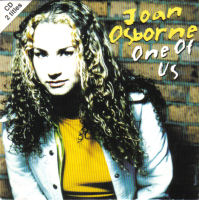
"One of Us" is a song by American singer Joan Osborne for her debut studio album, Relish (1995). Written by Eric Bazilian of the Hooters and produced by Rick Chertoff, the song was released on November 21, 1995, as Osborne's debut single and lead single from Relish, and it became a hit in November of that year, peaking at number four on the US Billboard Hot 100 and earning three Grammy nominations.

"Have You Ever?" is a song by American recording artist Brandy Norwood for her second studio album, Never Say Never (1998). The song was written by Diane Warren, while production was handled by David Foster. It was released as the album's third single by Atlantic Records in October 1998. The song became Norwood's second song to reach the top position on the US Billboard Hot 100, following the worldwide chart-topping of "The Boy Is Mine". The former further reached number one in New Zealand, number two in Iceland, number eight in Australia, and the top 30 in Canada, Ireland, and the United Kingdom.
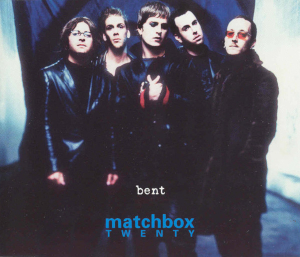
"Bent" is a song by American alternative rock band Matchbox Twenty. The rock ballad was shipped to radio on April 17, 2000, as the lead single from their second album, Mad Season, and was given a commercial release in the United States on July 5, 2000. "Bent" became the band's first and only song to top the US Billboard Hot 100, reaching number one on the chart dated July 22, 2000, and spending one week at the position. The song also topped the RPM 100 Hit Tracks chart in Canada for five nonconsecutive weeks.

"Don't Be Stupid (You Know I Love You)" is a song by Canadian country music singer Shania Twain. It was released in November 1997 as the second single from Twain's album Come On Over but was the seventh to be released to international markets. The song was written by Robert John "Mutt" Lange and Shania Twain. The single peaked at number six on the US Billboard Hot Country Singles & Tracks chart, becoming Twain's sixth top-10 hit on that chart, and peaked at No. 5 in the UK in 2000. The song was later released as her last single to European and Australian markets in 2000.

"I Can't Dance" is the fourth track from English rock band Genesis's fourteenth studio album, We Can't Dance (1991), and was released in December 1991 as the second single from the album. Lyrics were composed by drummer Phil Collins; music was written the band collectively. The song peaked at number seven on both the US Billboard Hot 100 and the UK Singles Chart, and also received a Grammy Award nomination for Best Pop Performance by a Duo or Group With Vocals in 1993. In Europe, the song reached number one in Belgium and the Netherlands, while peaking within the top five in Austria, Germany, and Portugal.

"To the Moon and Back" is a song by Australian pop duo Savage Garden. It was released in Australia on 4 November 1996 as the second single from their self-titled 1997 album. It was the follow-up to their hit "I Want You". It won the 1997 ARIA Music Award for Song of the Year. The song became the band's first number-one single in their native country, reached number three on the UK Singles Chart, and peaked at number 24 on the US Billboard Hot 100.

"Closing Time" is a song by American rock band Semisonic. It was released on March 10, 1998, as the lead single from their second studio album, Feeling Strangely Fine, and began to receive mainstream radio airplay on April 27, 1998. The ballad was written by Dan Wilson and produced by Nick Launay.

"Hands" is a song by American singer Jewel, released as the first single from her second studio album, Spirit (1998). Jewel wrote the song following an incident in which she considered stealing a sundress after getting fired from various jobs due to kidney troubles, and she decided that her hands were better suited to writing songs than stealing clothes. Written as one of the last songs for the album, the lyrics express how the smallest decisions have the power to make change. A piano-driven ballad, the song was serviced to American radio stations on October 7, 1998, ahead of its planned release date of October 19 due to a radio leak in Dallas, Texas.

"Down So Long" is a song written by American singer Jewel and produced by Patrick Leonard for Jewel's second album, Spirit (1998). Jewel wrote the song in 1992, when she was 18 years old. This was the second single that Jewel had not re-recorded vocals for its single release. The single release received a very slight change in the instrumental and was released on March 16, 1999.
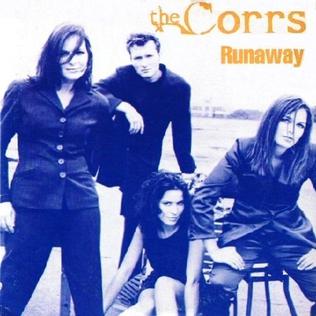
"Runaway" is a song by Irish family band the Corrs, released in September 1995 as the debut single from their first album, Forgiven, Not Forgotten (1995). It had middling chart success except in Ireland and Australia, peaking at number 10 in both countries. It was also an adult contemporary hit in Canada, reaching number two on the RPM Adult Contemporary Tracks chart and number 25 on the RPM 100 Hit Tracks chart. On the UK Singles Chart, it originally reached number 49, but a re-release in 1999 saw the single reach a new peak of number two on the same chart.

"G.H.E.T.T.O.U.T." is a song by American R&B duo Changing Faces. Released in 1997 from their second album, All Day, All Night (1997), and produced by R. Kelly, the single reached number eight on the US Billboard Hot 100 and spent four weeks at number one on the Billboard R&B chart. The song also became a top-10 hit in the United Kingdom and reached number 22 in New Zealand.

"I Love You Always Forever" is the debut single by Welsh singer Donna Lewis from her debut album, Now in a Minute (1996). Written by Lewis and produced by Lewis and Kevin Killen, it was released as the album's lead single in the United States on 16 April 1996 and in the United Kingdom on 26 August 1996. The song is inspired by H. E. Bates' novel Love for Lydia, from which the chorus is taken.

"Wishing I Was There" is a song by Australian singer-songwriter Natalie Imbruglia, released on 25 May 1998 as the third single from her debut album, Left of the Middle (1997). The track was produced by Phil Thornalley and was co-written by Imbruglia, Thornalley and Colin Campsie. The single reached number five in Canada, Hungary, and Iceland, became a top-twenty hit in the United Kingdom, and broke the top 30 in Imbruglia's native Australia.

Now in a Minute is the debut studio album by British singer-songwriter Donna Lewis, released in 1996. The album is best known for the single "I Love You Always Forever", which broke the airplay record in the United States for exceeding one million spins on radio, becoming the most-played single up to that point. Two other singles were released from the album, "Without Love" and "Mother".
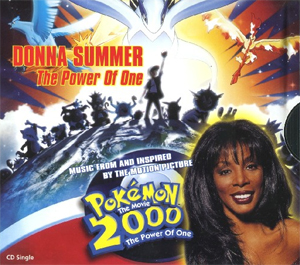
"The Power of One" is a song composed by Mervyn Warren and Mark Chait. It was performed by Donna Summer and is the theme song for the movie Pokémon: The Movie 2000. Pokémon: The Movie 2000, subtitled The Power of One, premiered in mid-1999 in Japan and was the second feature-length film based on the Japanese Pokémon video game series. It was also heard in the trailers for all three of the Kids' WB-released films.

"Spark" is a song by Tori Amos, released as the first single from her fourth studio album, From the Choirgirl Hotel (1998).

"Remember Me" is a 1997 song by British DJ Alexis 'Lex' Blackmore under his pseudonym Blue Boy, released as a single only. Built around samples performed by American singer Marlena Shaw, the song peaked at No. 8 on the UK Singles Chart in February 1997 and No. 2 on the US Billboard Hot Dance Club Play chart. It was a top-10 hit in Denmark, Finland, Iceland, Ireland, Norway, Spain, Sweden and Switzerland. On the Eurochart Hot 100, the track reached No. 13.




















